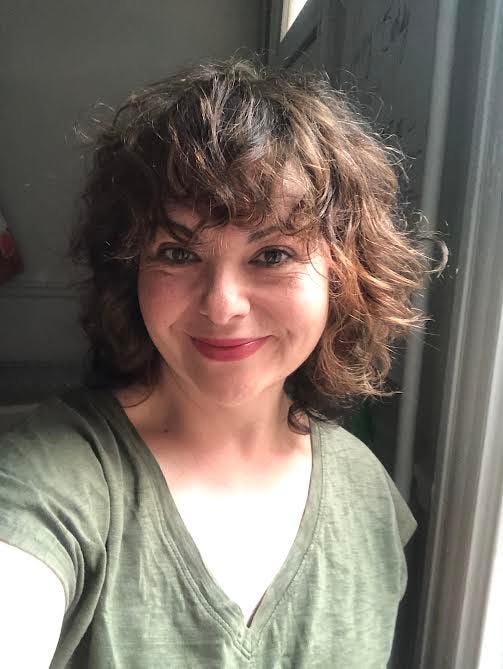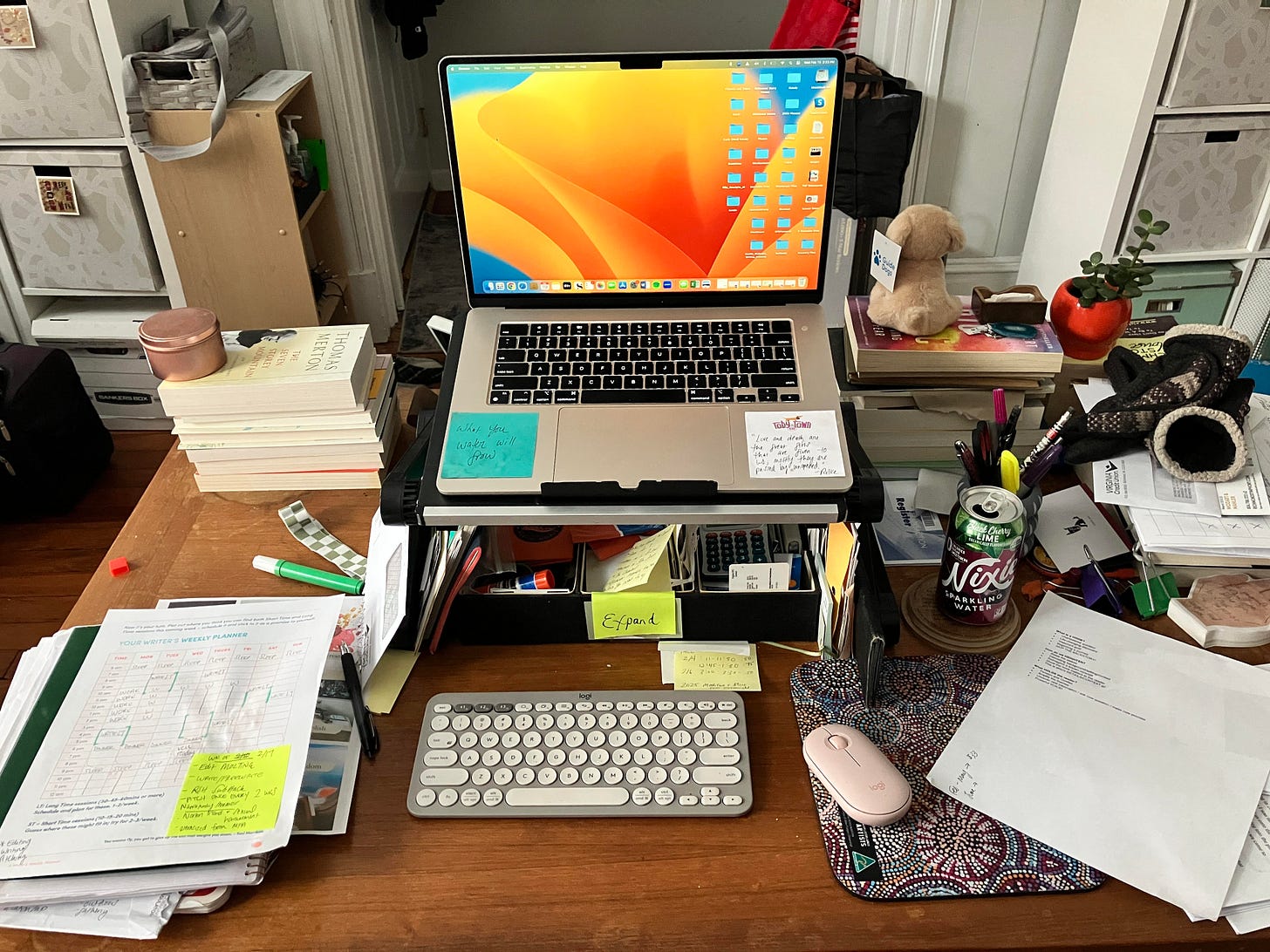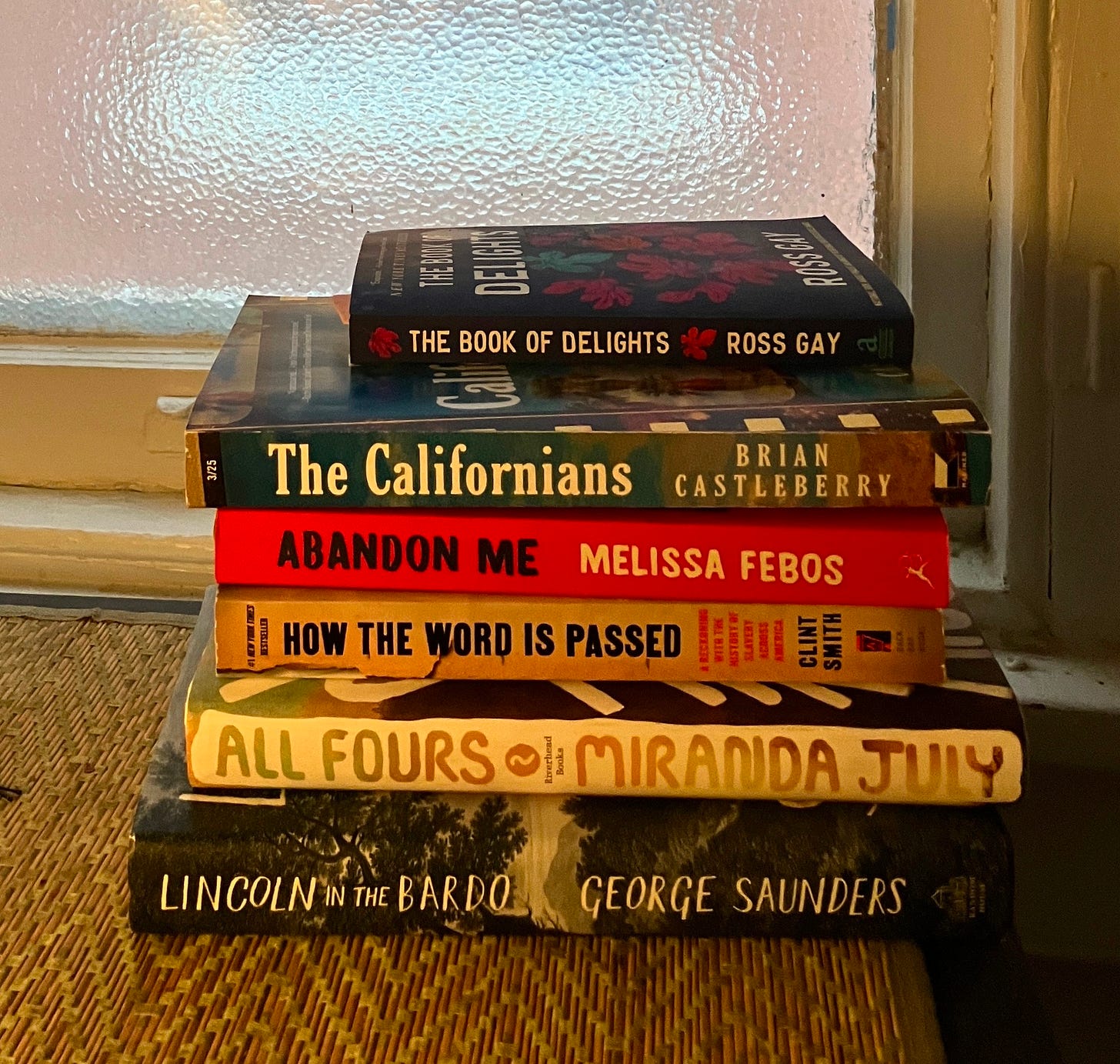SOON, issue 19: Shannon Fara O'Neill is 'Taking Care'
"I’ve really had to recalibrate my life, and I think a little bit of my writer ego (or at least a previous version) did not survive."
Welcome to Something Out of Nothing, a newsletter about meaning—making it, finding it, offering it. I talk about the writing life, teaching, thrifting, books, travel, obsessions and idle interests, and much more.
‘Taking Care’ is a questionnaire about how we manage our inner and outer lives as creative people. Shannon Fara O’Neill is a poignant, wry, and heartfelt writer of hard personal and universal truths. I'm fortunate to have known Shannon for many years and been entrusted with her early drafts in a workshop group, where I read in awe as she navigated the bone-deep dualities of grief and love, community and loneliness, in a modern world that, more often than not, seeks to flatten the complexity of our realities. Shannon is a writer of tremendous perseverance. She has been working on a couple of books as long as I’ve known her, and as someone who is also needing years to finish a book, I am inspired to be in her company, both as a friend and within the Richmond literary community.
Shannon Fara O'Neill is the director of Richmond Story House, and a writer of fiction and non-fiction whose work has appeared in Seventh Wave, Glimmer Train, Asian American Literary Review (AALR), and Mizna, among others. Shannon earned her MFA in Fiction at Virginia Commonwealth University. She is currently writing a memoir about grief and loss, trying to finish a crime novel, and a linked story collection, based on her family, which traces the history of two families from a small village in Lebanon to Dearborn, Michigan.
Shannon! What are you working on?
A few things at the moment, editing a couple of essays, coming up with ideas for my next Substack (I try to post bi-weekly) and working on some pitch ideas.
What is something you once thought about yourself that you no longer do?
I once thought I was a fiction writer and I would be a published author by the time I was 40. While I’ve had my writing published, I’m almost 50 and I haven’t written or published any fiction in over five years.
When is bedtime?
9pm.
What’s a habit or behavior that feels like taking care of yourself?
Every morning, I try to move slowly and with intention. This often means that I need to wake up at least two hours before I need to be somewhere. After my husband, Daryl, died in 2020, I really welcomed the morning in a completely different way, because it meant I had made it through another day. Ideally, I spend about ten minutes doing a guided meditation while sitting on my full-body heating pad, then write a bit in my journal or sketch while having coffee. I try very, very hard to not look at the news or my email until after I’ve walked my dog and had breakfast.
What did taking care of yourself look like in your twenties?
For most of my twenties I was living in Boston, it was the late ‘90s and everyone seemed to be making millions of dollars with some dot-com idea, and I felt like I was losing the rat race. Recently, I tried to remember what I ate or cooked when I lived in Boston, and I drew a complete blank. I remember going to the grocery store and then standing in the slush as I waited for the bus home, but what was in those bags is anybody’s guess.
I think taking care of myself back then meant having a job, being a good friend, and experiencing as much culture as I could, going to see live music, spending time reading in coffee shops, going to Harvard Square a lot for bookstores and movies.
How do you prepare yourself to write about particularly difficult subjects?
I write in small chunks. I’ve spent a lot of time the last several years processing the death of my husband and my mother while writing about it, which, for me, is part of the process of grieving. It really can take a toll. I make sure to let myself take a nap if I need it after writing something difficult, or go for a walk, get fresh air, move my body.
How do you recover after doing intense creative work?
Stepping outside even for a few minutes is extremely helpful for me. On the flip side, I also love watching TV to unwind, comedies if I’ve been doing heavy stuff. Or texting or calling a friend—basically, finding a way to connect to the here and now. Honestly, I have slowed my life down so much these last few years, I’ve tried to be doing constant recovery. Letting go of something that feels too painful in the moment, recognizing when I’m reaching a point of shutdown. I live alone, and, until recently, worked from home, so I spend a lot of time in my head. This means I have to be really careful and protect my energy.
What self-care advice rings false for you?
The idea of spending a lot of money because “you’re worth it,” or totally detaching from the world as self-protection. I think there’s a happy medium somewhere, where you can engage with the world and exist in it without burning yourself out.
How do you manage the way ambition feels?
I really love Cheryl Strayed’s idea that every book has a birthday, we just don’t know what the date is. It’s extremely hard not to compare myself to other writers I’m friends with or have met at various retreats or conferences, or to feel like I too must publish in “X” journal or publication and attend “Y” residency. I’ve really had to recalibrate my life, and I think a little bit of my writer ego (or at least a previous version) did not survive. “A rising tide lifts all boats,” is helpful to remember, knowing that the community I keep is thriving makes me happy for their success, and how we share resources and the limelight with one another is really heartening.
How can you tell when you’re coming up on burnout?
I’m not sure I can. I suppose it’s when I get snappy with people or feel rushed. When I start to feel disengaged from whatever I’m working on (or trying to work on), like if I can’t open the draft to look at it for more than a few minutes. But, that could also be procrastination :)
What level of “seize the day” are you?
I have a lot of free time, so molding my day has been a challenge. I try to plan my week so that I am writing or editing a bit most days. For the last year or so, taking online workshops has been really fruitful for me to get back in the zone, using prompts and focusing in a way that I haven’t been able to do in-person in a long time.
For the last year, I’ve really appreciated the robust writing community on Substack and the authors and writers here who offer courses, prompts, and community. I’ve learned so much and feel better connected to what we’re thinking/talking about when it comes to writing, and it’s made me approach my writing differently (i.e. thinking of writing for a broader audience, coming up with more prescient ideas). Special shout-outs to Amanda Montei’s Mad Woman Writing Group and Jeannine Ouellette’s Writing in the Dark.
What’s the playlist of late?
Music: A lot of Suki Waterhouse and Maggie Rogers.
TV: I just finished the second season of the show Mo on Netflix, highly recommend. Currently excited for Season 3 of The White Lotus.
Podcasts: Ten Percent Happier, WTF with Marc Maron, and Poetry Unbound.
How does money, and your relationship to it, provide care or support?
I actually wrote about this not too long ago on my blog. I’ve really struggled with my relationship to money. When it comes to my writing, I’ve very much tried to only submit to paid publications, unless it’s someone I know who is soliciting. After my husband Daryl died and my last part-time job dried up in 2021, I stopped working in the traditional sense all together. We had some money in savings and, after my mom died suddenly in 2022, I inherited more money. I’d like to say, as we always do when it comes to unexpected privileges, I’m “lucky” or “blessed,” but there doesn’t seem to be a good word for money coming into your life after experiencing two significant deaths back-to-back. Money received after a loved one dies is a tricky, tricky beast, but it has provided me with comfort and security, and the time to engage work that I find meaningful.
What are some forms of care that you’re discovering, or want to try?
I love my cardio dance class at the all-women studio I go to (if you live in Richmond, special shout-out to Maiden Motion!). Walking my dog is key to my sanity. And I’ve recently been taking art classes (drawing, pastels, watercolor) and that has been so much fun to find a new way to be creative.
What’s your relationship to night and day?
Despite my anti-work ethos, I still cannot kick the 9-to-5 habit. Late morning can be a productive time for me, and then it all kind of falls apart after lunch. I’ve been trying to flip my preferences recently by eating dinner a little earlier so I can work more in the evening, which also means trying to get up earlier in the morning to work out. In the evenings, I lose a lot of impetus to work.
What is comforting to you?
Having free time in the morning, petting my dog, being near trees, going to parks and being around people but also alone, sitting on my porch and sketching, meeting a friend at the start of my day, nice pens, walking through an art museum.
Whatever you’re able, if you’re able...
…but everyone has the same access regardless. SOON is entirely free—but if you’ve enjoyed it thus far, please consider a voluntary paid subscription of $5/month, $50/year, or $200/year as a Founding Reader. If a paid subscription just isn’t in the cards, it’s also a wonderful boost if you consider forwarding SOON along to the people in your life who might connect with it. Share button below xo.






